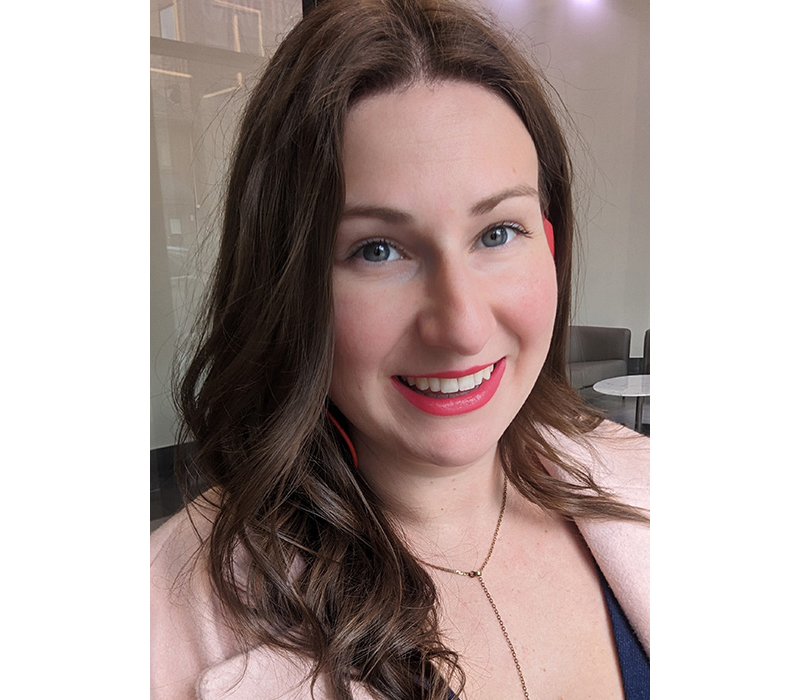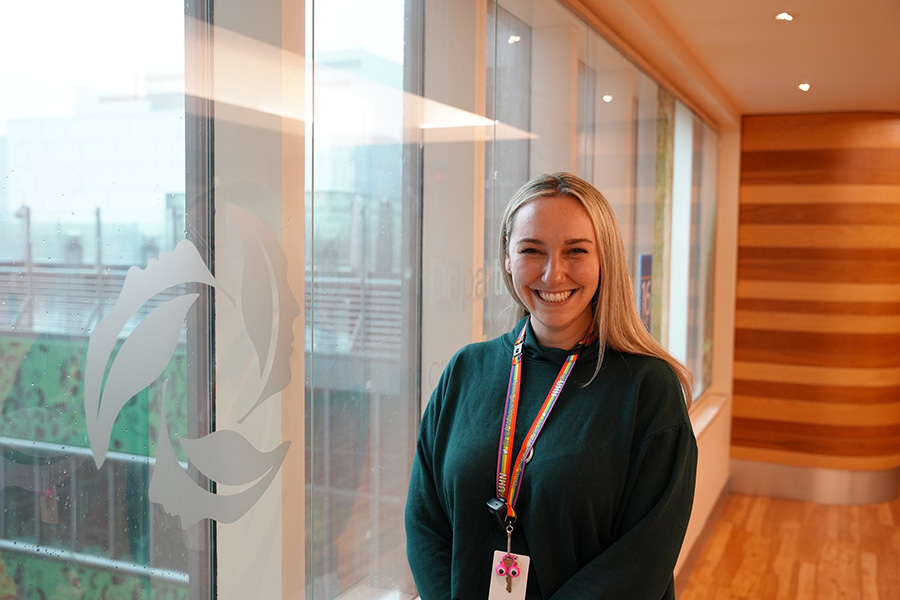
Joanna's only brush with cancer until that point was with much older family members.
"I remember thinking: I'm too young for this," she says.
As Joanna's appointments piled up, she felt overwhelmed and bombarded by the onslaught of medical information coming her way.
Fortunately, she was referred to the Adolescent and Young Adult (AYA) Program at Princess Margaret Cancer Centre – a unique program that offers patients under the age of 39 a chance to connect, form a community and reduce the stress of going through cancer at a young age.
"Our goal is to help young people recognize they have a community even when they're sitting in the waiting rooms surrounded by much older people," says Marlie Smith, Interim Clinical Nurse Specialist, who has been with the program covering a maternity leave since November 2021.
Marlie has seen first-hand the way a community of young people can come together to lift each other up, even in their darkest times. A cancer diagnosis is traumatic for so many individuals, and she personally reaches out to young adults at the beginning of their cancer journey to bring them into an environment where they no longer have to feel alone.
"With such physically demanding treatments, patients often don't have much time or capacity to unpack the various psychological effects of their diagnosis and treatment," says Marlie. "The AYA and psychosocial oncology programs help with this."
In Joanna's first call with Marlie, the overload of information immediately began to ease. The program focused on Joanna as a person, treated her as more than her diagnosis and provided support tailored to her needs.
"She was asking me questions about my specific situation before I even knew what I was up against," Joanna recalls.
In their first conversation, Marlie was able to provide support and options for some of Joanna's most vulnerable concerns and fears.
The AYA program, which began in 2014, includes monthly meetings where patients share their experiences and talk through difficult topics. Through counseling sessions and meetups, patients work through many unique concerns, including navigating school and work during cancer treatment, fertility, sexual health and body image.

(Photo: UHN)
The program offers both virtual and in-person options for convenience and accessibility.
For Marlie, developing these programs is about building rapport with patients and empowering them to advocate for their needs.
"Being in the same age bracket as my patients, I understand a lot of the life milestones they are experiencing," she explains. "I work with my patients to find creative solutions to help them achieve their goals and maintain as much normalcy as possible."
While the love and support of friends and family is important, there are some feelings and experiences only peers in the program could understand.
"The support of the AYA program made me feel like my hand was being held," Joanna says.
Cervical cancer has a significant impact on patients' fertility. Experiencing this at such a young age, Joanna struggled with concerns about how this would affect her body, future plans and relationships.
"A lot of the support I offer to these women is about grieving the loss of how they expected or hoped to grow their family," Marlie says, noting that some women choose to freeze their eggs or undergo other fertility-sparing options before beginning cancer treatment.
For Joanna, having a support system of other young women helped her process her infertility and navigate the difficult conversations she would have to have in future relationships. Marlie was also able to outline fertility options and give Joanna the information she needed to ask follow-up questions and advocate for her own needs.
The individualization of the programs and treatment in the AYA program is what impacted Joanna's treatment journey the most.
"I was noticed and cared for in a system that sometimes makes you feel like just another patient," she says.
Helping shape 'life-changing experiences for other young patients'
The AYA program sees patients in every stage of treatment, from the minute they get their diagnosis to years post-treatment, adding to the diversity of experiences each individual has to share.
"This is a program that meets each person exactly where they're at," says Joanna, who, like many cancer survivors, continues to participate in AYA program meetups and events.
As Joanna's needs evolved, so did the program. Throughout her treatment, the meetings allowed her to share and vent about her experience; she now seeks other perspectives and participates to hear about other people's stories, treatments and journeys.
Recently, she joined the AYA Committee, a group dedicated to understanding how the hospital can continue to provide support to this unique group of cancer patients.
"I'm excited to be able to provide a patient care perspective as someone who has been through treatment," Joanna says.
As Marlie reaches the end of her role at the Princess Margaret, she will be moving to a new position at the Stronach Regional Cancer Centre at Southlake Regional Health Centre, part of the Princess Margaret Cancer Care Network. She will develop a similar AYA program for patients in the Vaughan/Newmarket region.
"I love working with this population because they are incredibly insightful and know what they need and want, and to help them in such a vulnerable circumstance is completely fulfilling," Marlie says.
As for Joanna, she hopes to be able to provide hope, optimism and understanding to others going through a recent cancer diagnosis.
"I'm so energized by the idea that they're continuing to cultivate this beautiful community and I love knowing that I could help shape life-changing experiences for other young patients," she says.
"I try to become the support for others that I was looking for in my own journey."
This story first appeared on UHN News